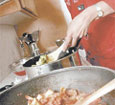
Nidhi Modi is just 21 but she already knows the recipe for becoming the perfect bride: Learning how to cook. "You may not know anything in the world but if you can cook even one fancy dish, it'll work like magic with your husband and in-laws," states the young woman with certainty.
Modi isn't your stereotypical, coy bride-in-waiting. She is a Mumbai girl, armed with a management degree, who is currently assisting her father in the family business. And yet, she subscribes to the traditional notion of woman-as-homemaker with alarming ease. "In our entire family, it is necessary for girls to know how to cook even though we have hired cooks. My dad doesn't eat food made by a cook. If you are from a good family, knowing how to cook is a must," she explains.
Modi isn't an exception, rather a disturbing norm that is an indicator of how a rapidly modernising India refuses to shed its gender bias. The surfeit of cooking classes, especially for brides, is testimony to this facet of urban India that believes a successful woman is one who manages career and home.
Meeta Bharwada, who runs Rasoii - a cooking institute in Mumbai's Vile Parle - says that she often gets queries from young women who are engaged to be married or have just been married. "They usually come with a list of dishes that their husbands or in-laws prefer. It is a quick-fix way of getting into their good books," she elaborates.
Bharwada runs a wide gamut of classes teaching different cuisine "from Mughlai vegetables and Rajasthani 'thali' (traditional Indian plate) to Italian and Chinese cuisine". She also has the very-popular desserts and mocktails offering. However, the popular demand of the season is festive food, a prelude to Diwali, when families come together. "Regardless of what we say, Indian culture demands that women carry out the responsibility of a homemaker even if she is a working professional. The expectations are too deep-rooted," she admits.
Bharwada is not off the mark. An Internet search for 'cooking classes in Mumbai' throws up some 80 results, while a similar one for Delhi has 30-odd options from which to choose. If that is not indicative enough, women themselves say they lap up new and easy methods of cooking. What has changed, though, is the need for quick-fix, yet delicious, recipes. Jigna Karia, 25, is a civil lawyer who has been a regular at cooking classes for the past year-and-a-half. "I've done courses in Mughlai and zero-oil cooking, as well as microwave recipes. I have also learnt how to make mocktails and cakes, last month," she says. Karia is currently single but is sure that her husband-to-be will be impressed with her culinary skills. "My mother-in-law will think I'm out of this world," she adds, only half-joking.
Karia is aware of the fact that cooking is still largely considered a female domain, despite the growing popularity of the food and beverage industry and of men training to become chefs. The home frontier, however, largely remains a woman's moral duty.
As Bharwada, who sometimes gets male students at her classes, points out, "Even if a man knows how to cook, how often will you find him getting up promptly and entering the kitchen, especially in front of guests? We ape Western culture in every other way except this one." Ankit Shah, a 21-year-old businessman clarifies that he didn't force his fiancée, Kavita, to learn cooking. "She wanted to do it herself," he shrugs. While he admits that he does not know how to cook and that it would have been alright if Kavita hadn't wanted to learn kitchen skills, he adds "it would be better so that if the cook doesn't turn up some day, she can fill in."
Gita Chadha, sociologist with the Russell Square International College, Mumbai, says, "Gender stereotypes have not changed. In some cases they might be transformed, but the standard expectations of women to be 'homemakers' and men to be the 'bread earners' continues in most cultures. In middle class homes where there is pressure for the women to earn, or when women want to pursue careers for their own self development, we find that they have to perform the 'dual role' of being home maker and bread earner."
It is not just the men who have to be bear the blame for this development. Women are equally responsible for reinforcing the stereotype. Jewellery designer Komal Kothari, 23, admits her family sent her for a cooking workshop even though she wasn't keen. "I don't really enjoy learning how to cook but because I know I'll be married some day and be expected to know this stuff, I'm doing it."
Most women are like Kothari, doing it despite the lack of a predilection towards cooking. "Part of the problem is the female self-image, which is still seeped within patriarchal expectations of looking good, being submissive, being 'domestic'. And the rest of the problem is with the culture that finds it convenient to maintain patriarchies," explains Chadha.
So, even as the modern Indian woman goes all out to woo men, and in-laws, with her kitchen expertise, she is very aware of gender disparities. As Karia puts it, "No one forces us to learn cooking but we still know it'll help us earn respect in our (marital) homes. Things are changing gradually, but the expectations from women remain."
(Courtesy: Women's Feature Service)
|
|
Read More: Delhi


Comments: